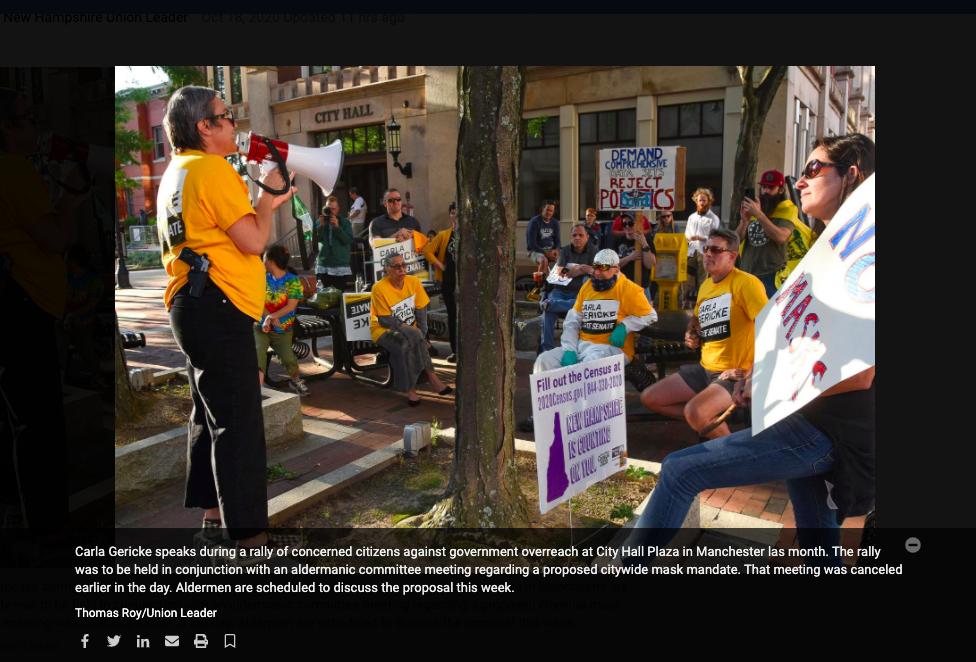Several articles appear in today’s Union Leader regarding the City’s attempt to reintroduce a mandatory mask mandate with a $1,000 fine that will be enforced by police and fire, leading to unnecessary confrontations with the public.
Drew Cline of the Josiah Bartlett Center, New Hampshire’s free market think tank, gets it right, when he asked “When is a mask mandate warranted?” saying, in part:
“Manchester aldermen are considering a mandate that would carry a $1,000 fine. City Health Department Director Anna Thomas told aldermen the point of the ordinance would be to educate the public about the importance of wearing masks.
No, the purpose of a public relations campaign is to educate. The purpose of a mandate is to force compliance. And the purpose of a fine is to punish.
Manchester Community College charges only $215 per credit. For $1,000, you could take a course in the Health Sciences curriculum, say, Probability & Statistics, learn more about the value of mask wearing, and still have $140 left over…
A mandate is an extraordinary measure to be reserved for the most extraordinary emergencies. New Hampshire’s infection rate remains well below 1 percent, its hospital capacity high, its voluntary mask wearing common. Even if mask mandates are comforting, it’s hard to make the case that they’re necessary to protect public health at this time.
And that — necessity — is the determining factor. The coercive power of government is not a tool with which to fine-tune people’s sensibilities. It is a last resort to be deployed when all other options are exhausted and the consequences of inaction are most dire.”
In “Both sides weigh in on Manchester mask proposal ahead of meeting” several City aldermen express their concerns with a mask mandate:
“Ward 8 Alderman Mike Porter said his opinion on the mandate hasn’t changed in the weeks since it was first proposed,
‘I strongly oppose a face covering ordinance in the city,’ said Porter over the weekend. ‘I strongly encourage everybody to wear a face covering but will not vote to mandate it. A plain reading of the proposed ordinance places an unnecessary burden on our already overburdened police and fire departments, and has the potential to create negative contacts between the public and our first responders.’
Porter added he strongly opposes the language involving ‘up to a $1,000 fine.’
‘This ordinance will only encourage a form of mask vigilantism by the public,’ said Porter. ‘The ordinance will create more problems than it solves.’
Other aldermen share Porter’s concerns.
‘I don’t support the ordinance as written because it is too onerous,’ said Ward 7 Alderman Ross Terrio. ‘I will consider a less restrictive ordinance that focuses on education over fines and is limited in what areas are covered.’
‘We should be meeting at City Hall and the mandatory mask ordinance is not needed, as people are doing safe things on their own, and there literally would be no enforcement,’ said Ward 12 Alderman Keith Hirschmann. ‘Seems this administration is following a national agenda.’
‘While I encourage people to wear a mask when they cannot socially distance themselves from others, I stand firm in my opposition to the government mandating an unenforceable ordinance demanding they do so,’ said Alderman-at-Large Joe Kelly Levasseur.”
In “‘High-risk’ behavior by some blamed for Manchester aldermen going remote” the aldermen set themselves up for a lawsuit by admitting they simply don’t want to face the public:
“‘High-risk behavior’ by members of the public is being cited as the reason Manchester’s aldermanic meetings will now be held remotely, after officials said the health and safety of staff and others were put at risk…
Ward 8 Alderman Mike Porter reacted to the decision in a social media post.
‘If elected officials can’t meet in person at City Hall — appropriately socially-distanced, wearing masks when moving about … then clearly masks are not the answer,’ he wrote. ‘Furthermore, if this is the precedent then schools should also be fully remote. If we as elected leaders can’t meet in person then kids and teachers should not meet in-person.’”
